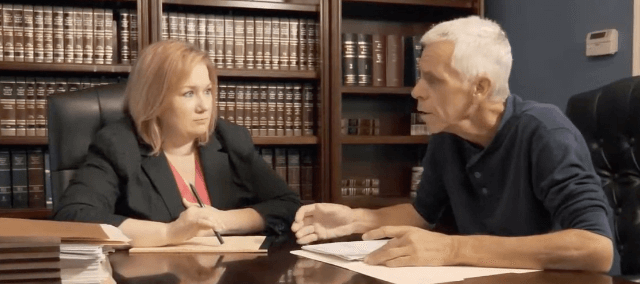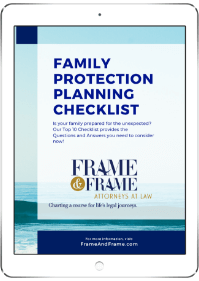Estate administration provides an accounting of a deceased person’s assets, and ensures that all property is accounted for and distributed pursuant to the deceased person’s will or according to the laws of Maryland if someone dies without a will. This ensures that heirs receive the assets that the deceased person intended for them to have. Tara Frame will effectively and efficiently represent you through all aspects of the entire process. The Maryland estate administration attorneys at Frame & Frame, LLC will guide you through each step of the estate administration process to minimize estate tax and other taxes, as well.
Maryland Estate Administration & Probate FAQs
What is not included in my Estate?
Not every asset or item of property, owned by a person at the time of death is included in the estate. Certain types of assets are not included by operation of law. The following are a few examples of assets that are not included in an estate and do not pass through probate.
- Life insurance proceeds: Most life insurance policies have named beneficiaries. In order to claim the policy benefits, usually all that is required is for the beneficiary to file a claim application, along with a copy of the death certificate, and the benefits will be paid. In the event that no beneficiary is named, the policy benefits are paid to the estate and would be distributed according to the Will.
- Joint tenancy property: Property that is owned by people as joint tenants with right of survivorship is not included in an estate. The property passes to the surviving joint owner and eventually passes through their estate upon their death.
- Property held in trust: Property that is held in trust is technically owned by the trust and not the individual. Therefore, the property is distributed according to the specific directions in the trust document and is not included in the decedent’s estate, even though the decedent may have been the trustee or was a beneficiary of the trust.
- 401(k), IRA, CD accounts, Annuities: Like life insurance policies, these types of accounts will usually have a beneficiary named. If so, the money in the account is paid directly to the named beneficiaries upon filing the proper claim forms and death certificate. It is often wise to use these types of accounts or to title property a certain way as part of your estate plan. As experienced estate planning attorneys, we can advise you how to properly use these accounts and how to title your property as part of your estate plan.
What is involved in the Maryland probate process?
1. Locate the decedent’s estate planning documents, including the following:
- Original Last Will and Testament
- Codicils
- Power of Attorney
- Revocable Trust Agreements
- Burial instructions
- Bank statements
- Brokerage statements
- Stock and Bond Certificates
- Life Insurance policies
- 401(K) statements and beneficiary designations
- Car titles
- Boat and RV titles
- Most recent income tax return
2. Schedule an appointment with an experienced and knowledgeable estate lawyer to probate the estate.
3. Determine the estate assets and their values. Obtain the values of all assets as of the date of death. This is usually found on the most recent statements from the various financial and banking institutions. For real property, you must discuss with your probate attorney whether it is best for the estate to use the county tax assessment or to obtain an appraisal, as there are certain tax consequences and benefits to the heirs and beneficiaries associated with each. Certain assets are not included in an estate and are considered non-probate assets.
4. Determine what debts or bills are outstanding and whether the estate is liable to pay them. Creditors have six (6) months from the date the estate is opened in which to file claims against the estate. If a claim is not timely filed, the estate may not be responsible for paying the debt.
5. Determine what, if any, estate or inheritance taxes are due. This may require the preparation and filing of a final income tax return (Form 1040), as well as an estate tax return (Form 1041).
6. Settlement of the estate and distribution of the estate assets:
- At the appropriate time, a Final Estate Administration Account must be prepared and filed with the Register of Wills.
- Once the Orphan’s Court approves the Final Administration Account, the Personal Representative/Executor may distribute assets pursuant to the directions in the Will.
7. Finalizing and Closing the Estate:
- For real property, an attorney must prepare a deed of distribution to the appropriate heirs.
- For stock accounts, the accounts might be liquidated and paid out in cash or the stock shares divided among the heirs or beneficiaries and paid “in kind.”
- If real property is sold by the estate, the beneficiaries of the estate may be entitled to a tax deduction, in which event, an accountant must issue a Schedule K-1 for tax preparation purposes.
With offices in Pasadena and Stevensville, our office serves all of Anne Arundel County, and Maryland’s Eastern Shore, including Queen Anne’s County, Kent County, Caroline County, Talbot County and Dorchester County.
Call the Pasadena probate attorneys at Frame & Frame to guide you through the complicated process of Maryland probate law.
Through the register of wills, the probate court, or Orphan’s Court, oversees the administration and distribution of all property that the deceased had owned at the time of death. This includes real property and personal property, including furniture and household goods, bank accounts, vehicles and any other property owned by the deceased person. Some assets, such as life insurance proceeds, annuity proceeds, retirement accounts, jointly owned real property or bank accounts and any other asset that has a beneficiary named, may not be included in an estate and may pass to the beneficiary directly.
The legal process involving the Registrar of Wills can ensure that the provisions of your Will are carried out properly and that your heirs receive that portion of your estate that you intended them to have. This can prevent estate litigation that can drive families apart and waste assets that could otherwise go to family members and loved ones.
Contact Our Maryland Estate Administration Attorneys
Contact us for a free initial consultation for Maryland estate administration & probate assistance. We will review your case and answer questions you may have.






